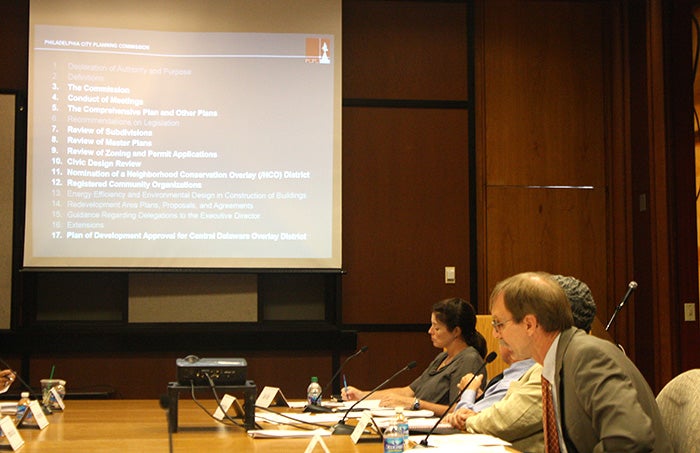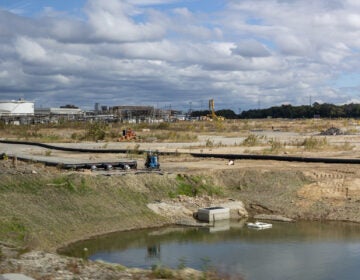Planning Commission amends, adopts new regulations

The Philadelphia City Planning Commission adopted an amended set of regulations for implementing the new zoning during its monthly meeting Tuesday afternoon. After a first draft of the regulations was adopted April 17th, several constituents requested an official hearing in order to provide feedback, which the Commission held at its meeting on June 12th. The new regulations incorporate several of the recommendations made by witnesses at that hearing.
Among the amendments included in the regulations was the removal of a provision requiring the Planning Commission to post its agendas at least seven days prior to its meetings. Commission Director Gary Jastrzab, who gave the report about the June 12th hearing, said that some constituents had considered that provision “burdensome or unworkable.” The Commission’s current practice is to post its agenda four to five days before a meeting.
Planning Commissioner Brian Abernathy pointed out that, while seven days is probably too many, having no requirement could be equally problematic. He proposed amending the regulations to require that the Commission post an agenda at least three days prior to a meeting; the Commission voted to include that amendment in the regulations.
The Commission also relaxed the provision governing conflicts of interest by removing penalties for false statements or “material omissions” on Commissioners’ or developers’ disclosure statements. The new regulations also exclude requirements that developers list the type of business entities they run, along with names, addresses, and titles of the primary officers of those entities.
The language concerning Civic Design Review (CDR) further clarifies—as though it weren’t clear enough—that that process is advisory and non-binding. The first draft of the regulations declared that “Projects that are subject to Civic Design Review, pursuant to the Zoning Code, should be designed to” enhance the public realm, “reinforce desirable urban features,” and promote public transportation, to name a few of the guidelines. The amended regulations remove references to “should,” in favor of “encouraging” CDR project developers to follow the listed guidelines. Jastrzab said the Commission staff was sensitive to the concerns that the original CDR regulations were “excessive” and “too restrictive.”
Jastrzab also reviewed the regulations’ updated provisions regarding Registered Community Organizations, which provided the sharpest point of controversy during the June hearing, and in many meetings and conversations prior to that. He pointed out that City Council adopted the RCO provision as part of the new zoning code last December, and that the Planning Commission was required to formulate regulations for its implementation.
But Jastrzab also said that the Commission had acted, since the June hearing, to “basically liberalize” the qualifying criteria for RCOs, which some witnesses had said were too onerous. The new regulations require that RCOs choose leaders through “elections,” while the previous draft called for “open elections.” They also stipulate that RCOs’ meetings with zoning applicants be open to the public; the earlier draft required that all meetings be open.
Councilwoman Jannie Blackwell has called for hearings in City Council to look into the creation of RCOs.
The new regulations include provisions regarding the Central Delaware Overlay, the currently effective version of which is carried over wholesale into the new zoning code on a temporary basis. Efforts to create a new overlay for the Delaware this past spring were unsuccessful; as an interim measure, Councilman Mark Squilla had the old overlay inserted into the new code. The new PCPC regulations include a “sunset provision,” which says that the interim overlay will cease to be effective “upon Council’s adoption of an Ordinance enacting land use and zoning controls that includes the boundaries of the Central Delaware Riverfront Overlay District and that does not incorporate a [Plan of Development] review procedure.”
Craig Schelter of Development Workshop was the only witness to testify after Jastrzab’s report on the public hearing. Schelter said that the updated regulations, which respond to some of his comments about references to “accepted plans” as well as “adopted plans,” are “slightly better” than the original draft. The new draft says that an accepted plan “may be considered in the development of the Comprehensive Plan,” while the earlier draft said that such a plan “shall be considered.”
The new regulations will take effect in ten days.
Contact the reporter at jaredbrey@gmail.com and follow him on Twitter @jaredbrey
WHYY is your source for fact-based, in-depth journalism and information. As a nonprofit organization, we rely on financial support from readers like you. Please give today.






